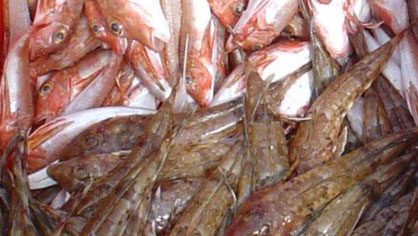4 March 2011
Marine Theme Objective: Economic and Social Research in the Marine Environment
What’s the problem?
The fishing industry presently loses significant value as a consequence of weak/absent markets for the full range of edible or otherwise usable species which are currently caught. This phenomenon is a significant cause of discarding (dead fish thrown overboard), and also contributes to fishing effort being focused on a narrower range of edible species, some of which are overexploited. While inefficiencies of the current regulatory system, imperfect markets, lack of information, poor product development, weak business skills and a failure to work co-operatively are all thought to be contributing to this market failure, a complete understanding of the causes and their relative importance is largely unclear.
Figure 1: The Fishing for the Markets project logo was designed with help from the pupils of Freethorpe Community Primary School, Norfolk. The winning picture was created by Eireann Hurley.What are the aims of the project?
This programme of work, also known as “Fishing for the Markets?, will provide the detailed and informed actionable insight needed for the subsequent development of effective future market interventions. These interventions will be designed to mitigate the core issues described above.
The programme of work includes a substantial element of field and market research to build the evidence base. The programme embeds customer engagement on many levels, contributing to the evidence base by way of capturing the collective intelligence and generating support for any solutions identified.
The work will identify the barriers and incentives needed to produce effective market-driven behaviour change and will serve to:
- Maximise the value from the existing catches (i.e. from a broader range of species).
- Decrease the reliance on the pressure stocks.
- Reduce wastage of natural resources.
- Support fishing communities.
- Increase revenue to fishers and drive greater efficiency in the supply chain.
Which policy areas will the research inform?
This research programme will help to deliver Defra?s objectives to “promote increased domestic food production”, sustainable food production from the marine environment and “pursue a zero waste agenda”.
It will also inform Defra?s policy to minimise discards, the Sustainable Access to Inshore Fisheries (SAIF) project and the reform of the Common Fisheries Policy.
Other UK customers that will benefit from this research are; consumers, the fishing industry, fish processors, retail & food service sectors, buyers & sellers of fish, providers of business and marketing support to the fishing industry, NGO’s and seafood accreditation organisations. Internationally, the work will also be of interest to the European Commission.How can we make better use of all the fish that are caught in English commercial
fisheries?
Fishing for the Markets commenced in December 2010 and has six distinct work packages (WP):
What are the results from the project and how will they be used?
WP: Evidence and Policy liaison will be provided by a specialist researcher who will directly facilitate linkages between the programme and policy development.
WP: The Customer and Market Intelligence work package will raise the profile of the core issues underpinning the programme of work whilst gathering insight and experience from a range of individuals and organizations along the supply chain, about existing market practice and any un-tapped potential for under-utilised species.
WP: Qualitative research methods will be employed in the Social Research work package to explore species interest and demand in informed fish eaters and at the high-end food service sector and ethnic cuisines.
WP: The Fish Markets work package will review the strengths and weaknesses of current fish market operations, identify best practice and areas for improvement.
WP: The Industry Skills component will explore the business development and marketing skills needed to get a greater diversity of species to market.
WP: An Evaluation Strategy will appraise the most appropriate methods and metrics for evaluating future interventions which address the core issues in market-led sustainability. Results are expected to be available by late May 2011.Where can I find further information about this and related research?
For more information about discards see: http://ww2.defra.gov.uk/environment/marine/cfp/discards/
For information on related research please contact Defra’s Marine and Fisheries Science Unit: marinescience@defra.gsi.gov.uk

